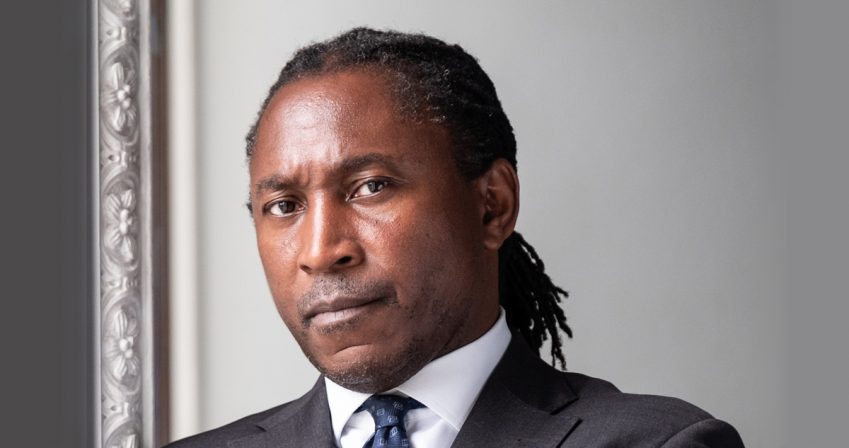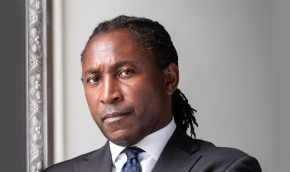The first Black Professor of Law in Gresham College's 400-year history.
Celebrating Diversity at the Bar
- Introduction
- Diversity Timeline
- Edward Akufo-Addo
- Obafemi Awolowo
- Joyce Bamford-Addo
- Solomon Brandaranaike
- Charlotte Boaitey-Kwarteng
- Joseph Ephraim Casely Hayford
- Eugenia Charles
- S Chelvan
- Thomas Morris Chester
- Learie Constantine
- Edward Cragg Haynes
- Patricia Dangor
- Coomee Rustom Dantra
- Gifty Edila
- Ezlynn Deraniyagala
- Taslim Olawale Elias
- Martin Forde
- Arthur Dion Hanna
- Ma Pwa Hmee
- Alexander Isbister
- Sibghatullah Kadri
- Seretse Kharma
- Moleleki Didwell Mokama
- Tunde Okewale
- Ashitey Ollennu
- Vallabhbhai Patel
- Lily Tie Ten Quee
- Ponnambalam Ramanathan
- Edward Richards
- Khushwant Singh
- Manjiit Singh Gill
- Teo Soon Kim
- Leslie Thomas
- Stella Thomas
- Leonard Woodley
Home › Celebrating Diversity at the Bar › Leslie Thomas
Professor Leslie Thomas KC
Call 1988, Inner Temple
Leslie Thomas was born in 1965 in West London. That same year the first legislation to outlaw racial discrimination was enacted in parliament (Race Relations Act 1965), but racial prejudice and inequality still effected black people who grew up in the sixties and seventies. Thomas’ earliest experiences of being racially profiled was at the age of 14, when after school four police officers jumped out of a police van and told him he looked suspicious, despite the fact he was still in his uniform. He was told that he fitted the description of a burglar in the area, but no description was given, so he was left to assume the burglar was Black and wearing a school uniform. These experiences would influence his career path. Thomas reflects,
I decided I wanted to go to the Bar - I didn't know it was called that then, but I had a burning desire to put right what was wrong. I wanted to help the small people in the world.
After an interview, Thomas received an unconditional offer to study law at Kingston Polytechnic (now Kingston University), graduating second in his class. He was called to the Bar at The Inner Temple in 1988. During his pupillage, he attended a settlement hearing between a large corporation and the widow of one of its workers, who had died during a chemical explosion. This experience made him realise that he wasn't comfortable representing corporate clients and was more interested in defending and helping the ‘David’s taking on the Goliath.’ He started volunteering at law centres and the National Council for civil liberties, and eventually moved to Wellington Street chambers where he worked on civil liberties and human rights cases. After Wellington chambers dissolved, he moved to Garden Courts and in that time has worked on a number of high-profile inquests including: representing 11 families who lost relatives at the Hillsborough disaster, New Cross Fire inquest, the Mark Duggan inquest, the Birmingham Pub Bombings and the Grenfell Pubic Enquiry.
Thomas says he still experiences discrimination in court, sometimes being mistaken for a defendant. He continues to call out unfairness and racism in society and the justice system.
Professor Thomas has collected numerous accolades in his career - becoming one of a small number of Black barristers to make the upper ranks of the legal profession as Queen's Counsel and, most recently, becoming the first Black Professor of Law in Gresham College's 400-year history. He was named Legal Aid Barrister of the Year in 2012 and, the following year, returned to Kingston University to receive an honorary degree in recognition of his outstanding contribution to civil rights. Thomas was also called to The Bar for the Commonwealth of Dominica in 2003, The Bar of Antigua and Barbuda in 2008, The Bar of Northern Ireland in 2014 and The Bar of Ireland in 2019. His year of silk is 2014.


Professor Leslie Thomas KC
An Inspiration
Chaeyld Casimir-Thomas writes about Leslie Thomas
I have chosen to write about Professor Leslie Thomas QC for many reasons. He is a role model and inspiration. Being called to the Bar in so many jurisdictions, especially The Commonwealth of Dominica, is an aspiration of mine and to see somebody who looks like me, who comes from my community gives me overwhelming hope for the future of the profession. His journey also highlights the struggles a young black barrister may face but can overcome, and he is very vocal about the diversity issues within the profession, which is reassuring for aspiring barristers such as myself.
Professor Thomas being named a professor at Gresham College, much less for the first black professor is a pinnacle moment for me. It shows me that my aspirations as a young black woman and aspiring barrister, are not too big or unrealistic. Lastly, he is an inspiration through representing the people of Grenfell and the Hillsborough disaster and all of his other inquest cases. Although I have an interest in all sectors of law, my ultimate goal is to represent those who are in too much of a vulnerable place to represent themselves and that is exactly what Professor Leslie Thomas achieves within his fields.
Professor Leslie Thomas continues to successfully represent vulnerable people in need, who, for the most part would not be able represent themselves whilst going through such trauma.